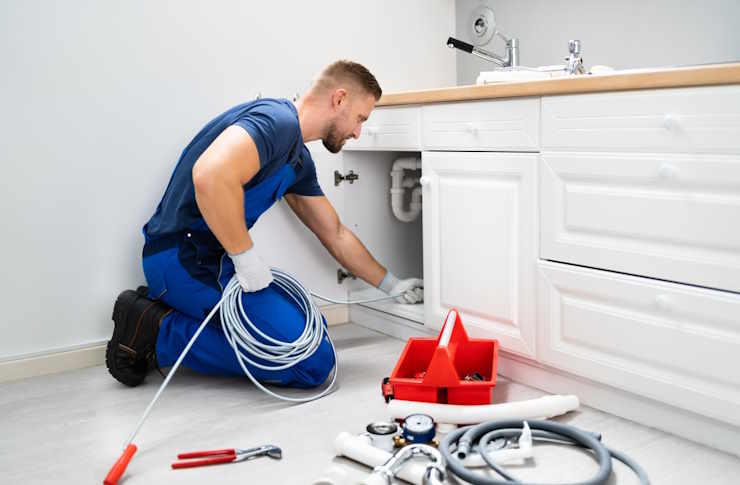A complete guide to career development for plumbers: a guide to local job hunting and skills advancement
Plumbers are an indispensable professional and technical type of worker in urban construction, responsible for the installation and maintenance of pipeline systems in various places. With the development of urbanization, plumbers have become a scarce talent in various places. This guide provides a systematic career plan for novices and career changers, covering employment prospects, job search channels and competitiveness improvement skills to help start a plumber's career.

Plumbing Careers: A Comprehensive Guide to Job Hunting and Skill Advancement
Plumbing is a vital profession in the construction and maintenance industry, offering diverse opportunities for those seeking a rewarding career. This guide provides a roadmap for aspiring plumbers and career changers, covering job prospects, search strategies, and skill development. Whether you’re just starting or looking to advance in the field, this comprehensive overview will help you navigate the plumbing industry and build a successful career.
What Does It Take to Become a Plumber?
Becoming a plumber requires a combination of technical skills, physical stamina, and problem-solving abilities. Most plumbers start with a high school diploma or equivalent, followed by an apprenticeship program that typically lasts 4-5 years. During this time, apprentices learn plumbing codes, safety practices, and hands-on skills. Many states require plumbers to be licensed, which often involves passing an exam and completing a certain number of work hours.
What Are the Different Types of Plumber Jobs?
The plumbing industry offers various specializations to suit different interests and skill sets. Residential plumbers focus on homes, while commercial plumbers work in businesses and industrial settings. Some plumbers specialize in specific areas such as pipefitting, steamfitting, or sprinkler fitting. There are also opportunities in plumbing design, inspection, and management roles. As you progress in your career, you may choose to focus on a particular niche or maintain a broad skill set.
How Can I Find Local Plumber Jobs?
Finding local plumber jobs requires a multi-faceted approach. Start by checking online job boards specific to the trades, such as Indeed, ZipRecruiter, or local union websites. Networking is crucial in the plumbing industry, so attend trade shows, join professional associations, and connect with other plumbers in your area. Don’t overlook traditional methods like contacting local plumbing companies directly or visiting construction sites to inquire about opportunities.
What Skills Should I Develop to Become a Competitive Plumber Candidate?
To stand out in the plumbing job market, focus on developing a diverse skill set. Beyond technical proficiency, employers value strong communication skills, as plumbers often interact directly with clients. Familiarity with building information modeling (BIM) software and green plumbing technologies can give you an edge. Additionally, business skills are crucial for those aspiring to run their own plumbing companies or take on management roles.
How Can I Advance My Plumbing Career?
Advancing in the plumbing field often involves continuous learning and specialization. Consider obtaining additional certifications in areas like medical gas systems or backflow prevention. Pursuing a master plumber license can open doors to higher-paying positions and the ability to run your own business. Some plumbers choose to advance into project management or estimating roles, while others may transition into plumbing inspectors or instructors for apprenticeship programs.
The plumbing industry offers numerous pathways for career growth and specialization. Many plumbers find success by developing expertise in emerging technologies such as smart home systems or water conservation techniques. Others focus on commercial or industrial plumbing, which often involves more complex systems and higher pay scales. Continuing education and staying updated on industry trends are key to advancing your career and increasing your earning potential.
| Certification | Provider | Key Features |
|---|---|---|
| Journeyman Plumber | State Licensing Boards | Basic plumbing license, required in most states |
| Master Plumber | State Licensing Boards | Advanced license, allows running a plumbing business |
| Green Plumbing Certification | IAPMO | Specialization in water-efficient technologies |
| Medical Gas Installer | ASSE | Certification for installing medical gas systems |
| Backflow Prevention Tester | ASSE | Certification for testing and maintaining backflow preventers |
What Are the Future Prospects for Plumbing Careers?
The future of plumbing careers looks promising, with steady job growth projected in the coming years. As infrastructure ages and new construction continues, the demand for skilled plumbers is expected to remain strong. Emerging technologies in water conservation and smart home systems are creating new opportunities for plumbers to specialize and expand their services. Additionally, the increasing focus on sustainable building practices is driving demand for plumbers with expertise in green technologies and energy-efficient systems.
The shared information of this article is up-to-date as of the publishing date. For more up-to-date information, please conduct your own research.




